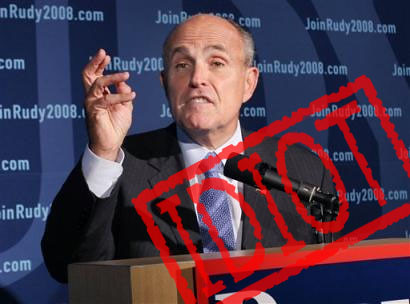The following paragraph was plucked directly from Rudy Giuliani's essay in the September/October issue of Foreign Affairs:
Another step in rebuilding a strong diplomacy will be to make changes in the State Department and the Foreign Service. The time has come to refine the diplomats' mission down to their core purpose: presenting U.S. policy to the rest of the world. Reforming the State Department is a matter not of changing its organizational chart -- although simplification is needed -- but of changing the way we practice diplomacy and the way we measure results. Our ambassadors must clearly understand and clearly advocate for U.S. policies and be judged on the results. Too many people denounce our country or our policies simply because they are confident that they will not hear any serious refutation from our representatives. The American ideals of freedom and democracy deserve stronger advocacy. And the era of cost-free anti-Americanism must end.
That statement makes the inconsistencies in Mitt Romney's piece from the last issue look relatively minor.

Does Giuliani know what the Foreign Service does on a day-to-day basis? Most spend their time issuing visas, helping U.S. citizens abroad, conducting intergovernmental business and most importantly, maintaining an understanding of the countries they are working in. We are in the second decade of the Information Age and the Hypertext Markup Language is more than 15 years old. The president can present U.S. policy to the world in a thirty minute press conference. He doesn't need drones to mindlessly repeat U.S. policy ad nauseam.
This brings us to the fact that Rudy Giuliani's approach to foreign policy demonstrates the savvy and depth of in a high school boy who goes to debate club meetings to cruising for girls with low self-esteem issues. Members of the international community don't disagree with us simply because we haven't explained our position well enough. They disagree because they don't like some (or all) aspects of U.S. policy.
Despite what a neoconservative will tell you, there is no such thing as objective moral high-ground in international relations. The U.S. can't just state its foreign policy to the international community and assume that anyone (short of the British and Australians) will blindly follow suit. Leadership is not just stating policy, but instead, its haggling and cajoling allies, friendly and even hostile countries needed to get everyone on board with a policy.
Giuliani's approach feels like it will be all talk, but no action. I mean, how exactly does he propose raising of the cost of anti-Americanism abroad? Imposing sanctions? Ending diplomatic relations? Punitive military action? Get real...
One last thing: Does anyone else remember the News Hour interview with Condi Rice from late 2002 where she almost says 'leadership breeds followership'? It was such a classic demonstration of the Ameri-centric worldview that is becoming popular among baby-boom generation politicians and foreign policy elites.

4 comments:
I think it is entertaining how Foreign Affairs is basically letting these candidates hang themselves with their unlimited word format, and its probably a good thing.
So far I am not impressed with any of them.
I thought Obama's essay was mildly interesting, but you're right, every essay I've seen so far is pretty light on substance.
Ironically, I bet you couldn't guess my favorite election year Foreign Affairs essay - it was Condi Rice's 'Promoting the National Interest' from the January/February 2000 issue. I think the essay is great because it clearly outlines Bush's pre-9/11 foreign policy strategy, but also hints at a policy valuation process that I believe survived into the global war on terror.
You are, of course, wrong that there is no objective moral high ground. The fact that the United States no longer seems to occupy this position does not refute its very existence. Leadership is not "haggling". Leadership is providing a firm example for the rest of the world to follow. Again, we in the US are doing a piss-poor job of this at the moment, but this does not in and of itself refute the need for leadership by example rather than "followership" through negotiation. Granted, Rudy Giuliani is at least as much of an ass as the lead players of the current administration, but if you want to deplore the state of Republican Party politics in a manner that connects with the populace, you'll have to do better than that. As it stands, we'll be facing a choice between Mr. Giuliani and Sen. Clinton, and neither is even close to an optimal choice.
Mr. Anonymous - Okay, you're right. I was too hasty to denounce the concept of a moral high ground in international relations.
There are high grounds on some issues, such as torture, political freedom, religious freedom and due legal process. Many American claims to these high grounds are undercut by hypocrisy within U.S. foreign policy.
The saddest part is that this hypocrisy is not the result of bad intentions. It is merely the result of domestic haggling between interest groups, the executive, the Congress and the public.
To revise me original point slightly, there are few moral high grounds and it would be very unwise for Americans to assume that we occupy any of them.
Post a Comment